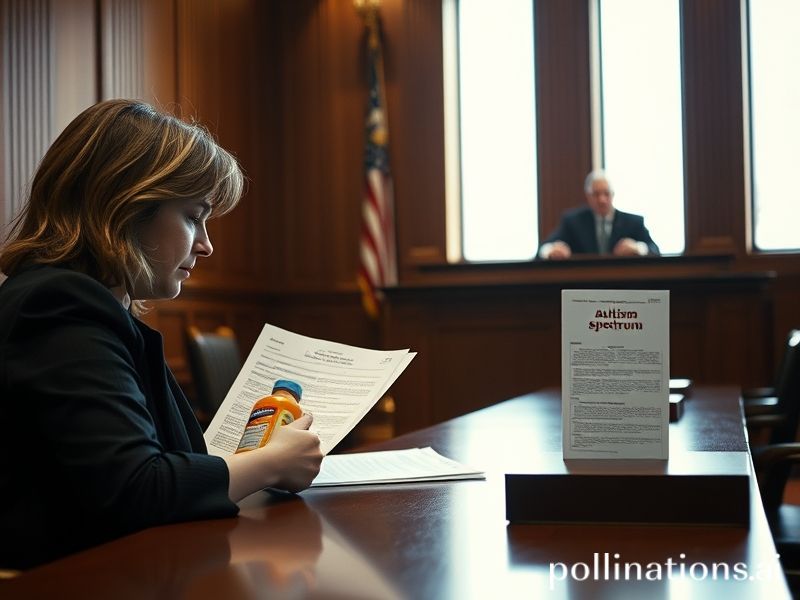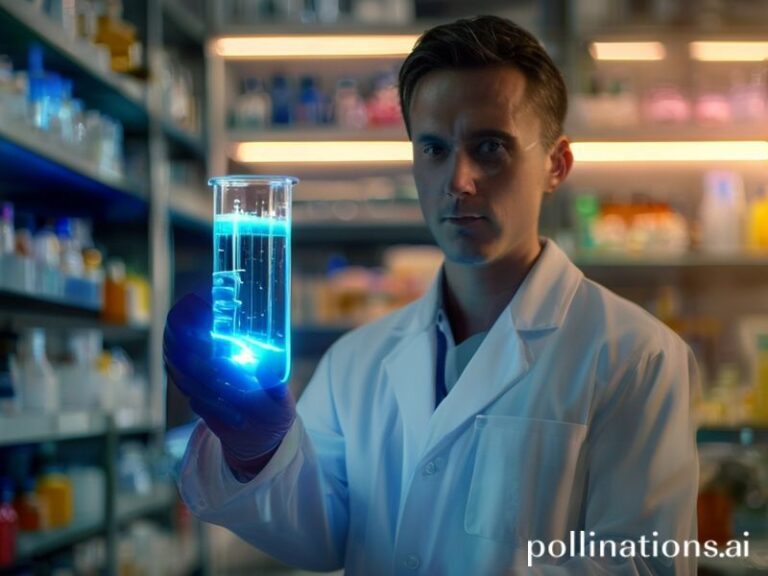Global Tylenol Autism Lawsuit: How One Painkiller Became the World’s Favorite Legal Piñata
Tylenol, Autism, and the Beautifully Unhinged Global Litigation Circus
By Dave’s Locker International Bureau
If you’ve ever watched a toddler pop a fever reducer and wondered whether you’ve just administered the gateway drug to neurodivergence, congratulations—you, too, may be eligible for emotional damages and a starring role in the Tylenol autism litigation currently metastasizing across four continents. What began as a lone federal case in Illinois has exploded into a multinational legal jamboree, featuring plaintiffs from Toronto to Tel Aviv, law firms with more satellites than the ISS, and pharmacologists arguing over epidemiology like medieval monks disputing how many angels can dance on a statistically significant pinhead.
The core claim—echoed in 180-odd U.S. cases consolidated before Judge Denise Cote in Manhattan—is that prenatal exposure to acetaminophen (paracetamol to the rest of the planet) heightens the risk of autism spectrum disorder and ADHD. Plaintiffs lean on a 2021 consensus statement signed by 91 scientists; defendants, namely Johnson & Johnson and every generic maker from Aurobindo to Zydus, counter that the statement is basically a glorified group chat with footnotes. Meanwhile, regulators from the FDA to the EMA maintain the drug is still safer than letting fever cook a fetus like sous-vide salmon, but have agreed to “monitor.” In bureaucrat-speak that’s the international equivalent of “thoughts and prayers.”
Europe, never one to miss a good moral panic, has taken the litigation aesthetic and turned it into policy theater. France’s ANSES issued a “precautionary” warning urging pregnant women to consult physicians before swallowing the little white pills—an advisory as useful as reminding Parisians to consult philosophers before breathing. Germany’s BfArM, in Teutonic fashion, demanded more data, preferably triple-blind and delivered on parchment. The UK’s MHRA merely updated an FAQ page, because nothing screams urgency like a frequently asked question.
Across the Pacific, Japan’s Ministry of Health has taken the subtle approach of printing even tinier kanji on the foil blister packs, while South Korea’s plaintiffs’ bar is reportedly “studying the American playbook with the enthusiasm of K-pop trainees learning choreography.” China, ever pragmatic, simply banned a few generic brands on “quality” grounds, neatly sidestepping the scientific debate and reminding everyone that authoritarianism has its conveniences.
The global significance here isn’t really about whether acetaminophen rewires fetal brains; it’s about how neatly the story slots into our post-truth, algorithmically amplified age. A single meta-analysis gets retweeted by a Hollywood actress, and within weeks every anxious parent on Reddit becomes a citizen-epidemiologist armed with PubMed links and the moral certainty of a jihadist. Class-action billboards pop up like mushrooms on every highway from New Jersey to New South Wales. Law firms with names that sound like failed prog-rock bands—“Rheingold, Giuffra, Ruffo & Plotkin”—buy Google ads translated into 17 languages, each promising “NO FEE UNLESS WE WIN,” a phrase that loses none of its carny charm in Portuguese.
For the pharmaceutical giants, the nightmare isn’t merely financial—though settlements could run into the tens of billions, enough to make even J&J’s talc reserve look like petty cash. It’s existential. If yesterday’s household staple becomes tomorrow’s Agent Orange Lite, the entire over-the-counter ecosystem trembles. Imagine a world where parents from Lagos to Lima second-guess the safety of a humble painkiller. Spoiler: that world is already here, and it’s stocked with homeopathic arnica and the faint smell of burning sage.
And yet, beneath the cynicism lies a darker irony. Autism rates have climbed everywhere, not because evil chemists are sprinkling neurotoxins into our drinking water, but because diagnostic criteria keep expanding like a Russian nesting doll. We are pathologizing difference at the same moment we celebrate neurodiversity on corporate landing pages. The lawsuit, then, is less about science than about storytelling: a comforting narrative that someone, somewhere, must pay for the bewildering complexity of human variation.
So stock up on popcorn—or, if you’re pregnant, perhaps just tepid water—because the show runs for years. Appeals courts will split, settlements will blossom and wither, and somewhere a Danish registry study will conclude that everything is correlated with everything else, including herring consumption. By the time the dust settles, today’s toddlers will be launching their own TikTok accounts, possibly while stimming to lo-fi remixes of courtroom audio.
In the end, the Tylenol autism saga is less a legal battle than a planetary Rorschach test: we see what we fear—corporate malfeasance, maternal guilt, the random cruelty of biology. And like any good inkblot, the only definitive answer is that someone, somewhere, is already billing by the hour.







